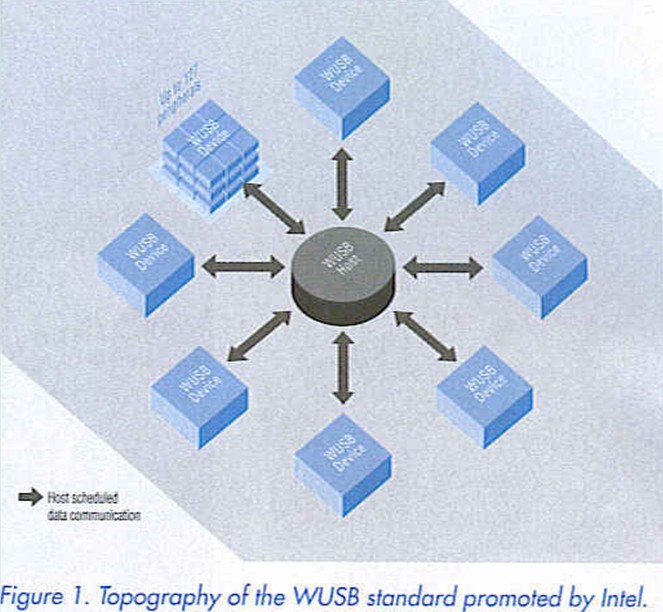

Project Solutions
Wireless USB (1)
Published:2011/7/31 20:33:00 Author:Phyllis From:SeekIC
By Thomas Biel
Conventional USB has certainly become an indispensable feature of everybody’s desk. It is used to connect scanners, cameras, hard disks, sound systems and webcams after the initial installation, and the PC or laptop can remain switched on while the cables are connected or disconnected. This is naturally all very convenient, but the drawback is the large number of cables attached to the system. The backs of many desks have come to resemble cable cabinets.
This could all be remedied by a new standard for wireless USB devices. In the same way that wireless LAN replaces LAN cables, wireless USB is intended to replace USB cable connections in the future (see Figure 1). Under the leadership of Intel, interested manufacturers have formed the Wireless USB Promoter Group to develop a common standard for wireless USB devices. This involves developing a radio technology that provides reliable data transmission at high data rates over short distances among devices such as home entertainment equipment, PC peripherals and mobile devices. For example, it could be used to transfer multimedia content without any cables or stream high-resolution video data from a digital video recorder to a television set in the living room. 
According to Intel, wireless USB (WUSB) is intended to be fully compatible with the USB 2.0 standard. Among other things, this means a data transmission rate of up to 480 Mbit/s, as well as driver standards and device infrastructures that comply with the USB 2.0 specification from USB.org.
The targeted working range is 1 0 metres, in order to comply with the device power consumption requirements defined by USB.org. Intel believes that development of commercial products using wireless USB will be possible as early as 2005. This is intended to be assisted by support from various industry organisations in the wireless data communication and mobile telecommunication industries, such as the Multi-band OFDM Alliance (MBOA), the WiMedia Alliance and the previously mentioned Wireless USB Promoter Group.
Something completely different and significantly more concrete is a technology that Cypress has been promoting since late 2002 under the name WirelessUSB™’. The Cypress WirelessUSB™ technology differs from the standard being promoted by Intel in the data transmission rate, the frequency band that is used, and above all in the intended application area. The maximum data transmission rate is only 62.5 kbit/s. This very low data rate (even relative to USB 1.0) is fully adequate for applications such as alarm systems, PC mice, keyboards, gamepads, joysticks, household appliances, pagers, regulation and control units, inventory management, instrumentation and the like. The designation ’WirelessUSB’ thus does not refer to the data rate, but instead to the fact that the connection at the PC end is made via the USB port. A wireless USB transponder using a Cypress IC is simply plugged into a USB port, just like the familiar Bluetooth USB adapter (which also has a higher data rate of up to 723 kbit/s). Cypress cites the following advantages of their approach compared with Bluetooth: shorter latency (the time required for a connection to be established -less than 8 ms for WirelessUSB, versus as much as 2 s for Bluetooth), lower hardware complexity, lower cost, and no need for an extra driver (with operating systems having USB support). Like Bluetooth USB adapters, the wireless USB components from Cypress are available in two working range versions: ’LS’ for ranges of a few metres and ’LR’ for ranges up to 50 metres.
Reprinted Url Of This Article: http://www.seekic.com/blog/project_solutions/2011/07/31/Wireless_USB__(1).html
Print this Page | Comments | Reading(311)
Article Categories
New published articles
· Imagination works with TSMC to develop FinFET process
Author:Ecco Reading(33527)
· XMOS pushes event-driven MCUs with lower price
Author:Ecco Reading(3534)
· Intel brings upgraded 32-nm SoC for smartphones
Author:Ecco Reading(3250)
· Micron pushes TLC 128-Gbit NAND flash
Author:Ecco Reading(3816)
· Intel will stop supplying desktop motherboards
Author:Ecco Reading(5341)
· Processor market was expected to regain strength in 2013
Author:Ecco Reading(3318)
· It was reported that TSMC sales fall steeply
Author:Ecco Reading(3474)
· Cisco, NXP work with auto wireless startup
Author:Ecco Reading(3620)
· Micron was impacted by manufacturing glitch
Author:Ecco Reading(4017)
· China can make 22-nm transistor by themselves
Author:Ecco Reading(3820)
· Chip market rebound is coming, according to survey
Author:Ecco Reading(3761)
· Sony, Toshiba will spend more on chips, iSuppli reports
Author:Ecco Reading(3790)
· Qualcomm becomes the 13th company to join NFC Forum board
Author:Ecco Reading(6105)
· TSMC increases building work for FinFET fab
Author:Ecco Reading(3778)
· TI plans to cut 1,700 jobs in OMAP shift
Author:Ecco Reading(4587)